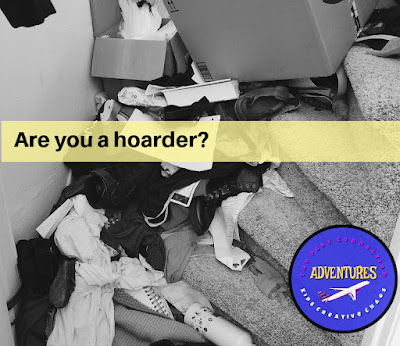What can you do when someone suffers from hoarding disorder?
Have you ever joked about a friend being a hoarder because their desk is covered in papers, or their home is cluttered? Hoarding is a real issue for some people, and it is very distressing. At first, a lot of hoarders don't notice the issue and they probably can't see how it’s affecting their lifestyle or worrying their loved ones. If they do recognize the problem, hoarders might feel embarrassed and isolated from friends and family. So, what is hoarding disorder, and how can you help someone who suffers from it?
Hoarding Disorder and Causes
Hoarding disorder is when an individual keeps a lot of things, no matter what the value of these items.They could have anything from broken appliances to old newspapers stored away in their homes leaving their home untidy, dirty, and a generally unpleasant space to be in.
A person with hoarding disorder feels upset or anxious about getting rid of the clutter because they've often formed a strong emotional attachment to these objects, particularly if the hoarded item represents something sentimental to them. Several mental health issues can be connected to hoarding disorder: severe depression, obsessive-compulsive disorder, and psychosis. If the person with hoarding disorder has recently gone through a difficult period in life, such as the death of a loved one, the breakdown of a relationship, or another traumatic event, this may serve as a catalyst for developing the disorder.
Hoarders often find comfort in collecting and saving items for future use. Of course, hoarding disorder can happen to anyone, but it isn’t uncommon for hoarding to develop in people who live alone or grew up in an untidy environment.
What Can You Do About It?
Hoarding disorder is when an individual keeps a lot of things, no matter what the value of these items.They could have anything from broken appliances to old newspapers stored away in their homes leaving their home untidy, dirty, and a generally unpleasant space to be in.
A person with hoarding disorder feels upset or anxious about getting rid of the clutter because they've often formed a strong emotional attachment to these objects, particularly if the hoarded item represents something sentimental to them.
Several mental health issues can be connected to hoarding disorder: severe depression, obsessive-compulsive disorder, and psychosis. If the person with hoarding disorder has recently gone through a difficult period in life, such as the death of a loved one, the breakdown of a relationship, or another traumatic event, this may serve as a catalyst for developing the disorder. Hoarders often find comfort in collecting and saving items for future use. Of course, hoarding disorder can happen to anyone, but it isn’t uncommon for hoarding to develop in people who live alone or grew up in an untidy environment.
Since hoarding is linked to mental health, typical treatments include CBT (Cognitive Behavioural Therapy) and counseling to identify the root cause of the hoarding. If the hoarding is associated with depression, antidepressant medication might be prescribed and allow for some relief.
If you're concerned that a loved one has a hoarding disorder, gently suggest that they visit the GP with you. Remember, a lot of people with this disorder don't recognize that there's a problem. Others may feel embarrassed, so be patient with them. Let them know that you care and that you are there for them whenever they feel overwhelmed or when they're ready to talk about their circumstances.
When a hoarder is ready to deal with the issue and start organizing their home, you might also need professional services to help. Hoarder clean up services are specialists in dealing with these situations and understand how emotional and difficult it can be for the individuals who suffer with the disorder. A clean up service will also be able to deep-clean the property to make it a safe, healthy living environment for your loved one. While people might joke about being a hoarder, for many people, this is a serious issue that impacts their daily lives. If you're concerned that you or someone you love has developed a hoarding disorder, speak to mental health professionals for further advice on what steps you need to take.
Recommended:
Protect your Teen from Mental Health DisordersSuffering from Emotional Issues?






















